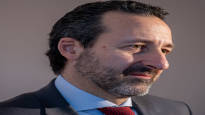Secretary General of the International Red Cross Robert Mardini requires the parties to the Gaza conflict to respect the international rules of the law of war, i.e. humanitarian law. They oblige to keep military and civilian targets strictly separate.
– They have [sodan osapuolilla] there is a duty to protect civilians by all possible means. They are required to make a clear distinction between military targets and civilian targets such as residential areas and hospitals. They also have to make sure that the use of force is proportionate, says Mardini, who is currently in Finland, in an interview with .
During the visit, he will discuss the support given to the organization with representatives of the Finnish government.
The protection of civilians is the core point of the Geneva agreement, Mardini reminds. According to him, this is especially important to keep in mind in the Gaza conflict.
– When looking at the horrors of war and the ever-increasing suffering of civilians, the task of organizations like the Red Cross is to constantly repeat that the obligations of international law must really be taken seriously. They are not made discretionary, but are mandatory, Mardini emphasizes.
The International Committee of the Red Cross (ICRC) supports the Palestinian Red Crescent in Gaza. The ICRC operates throughout the region, i.e. Gaza, Israel and the West Bank.
The Palestinian Red Crescent has 130 employees on site, one hundred of whom are local and 30 foreigners.
The ICRC has two hospital teams in Gaza. In addition, the organization supports local authorities in rehabilitating the water supply.
The conditions in Gaza are appalling
According to Mardin, the conditions of the civilians in Gaza are extremely difficult, as there is a shortage of all supplies. Food, drinking water and hospital supplies are in short supply.
There are two hospitals in the southern part of Gaza that are capable of providing aid to the injured, but their reception capacity has also weakened. In addition, there are thousands of civilians seeking shelter in the hospital premises.
Mardini is horrified by the situation where only one fifth of Gaza’s already tight land area is used, and the entire civilian population of the region, more than two million people, has been crammed there.
Help for the hostages?
The Red Cross is an aid organization that does not take a position on questions of guilt in wars, but remains strictly neutral. But if the organization detects a violation of humanitarian law, it is pointed out to the party to the conflict.
The organization has clearly stated that taking hostages is against international law.
The ICRC has appealed to Hamas to allow the organization to meet the prisoners, check their health and possibly deliver medicine. Hamas has not agreed to the request.
However, the ICRC has been in the process of freeing more than a hundred hostages from Hamas captivity.
According to Mardin, release situations are very sensitive. Although it’s really just about moving a few people from one place to another, in fact everything had to be planned very carefully and openly. The transfer of prisoners must take place in a carefully planned manner so that nothing goes wrong.
The ICRC has also helped Palestinians imprisoned by Israel in prisons. However, the activity was interrupted by a Hamas attack, after which Israel has not allowed visits.
Information exchange in Ukraine
Ukraine is the ICRC’s largest ongoing operation.
The organization supports Ukraine’s health services, but it also operates in some areas that have been seized by Russia from Ukraine. The focus of this activity is the reunification of families separated by war. For example, the Red Cross is able to convey to soldiers’ relatives the information that the missing soldier is not dead, but a prisoner.
The wars in Gaza and Ukraine are now the most publicized conflicts. Mardini reminds us that according to the ICRC’s calculations, there are currently no less than 117 conflicts in the world. Most of them never make the media headlines.
Military confrontation is by no means the only component of crises, Mardini explains. For example, there are several crises in central Africa where, in addition to war, the problems are exacerbated by climate change.
In addition to this, the population has to find out, for example, about the rise in food prices, where the conflict in Ukraine is a major factor – after all, Ukraine was a major grain exporter before the war. Crises can therefore consist of several components, Mardini states.
